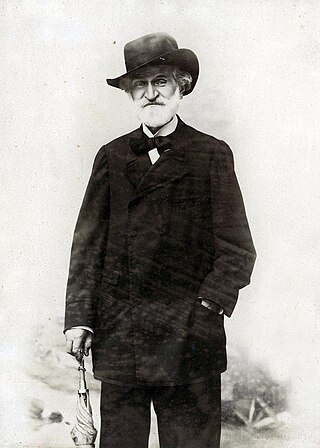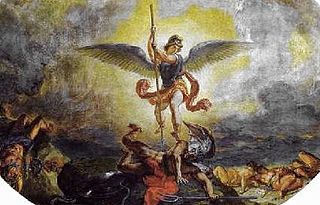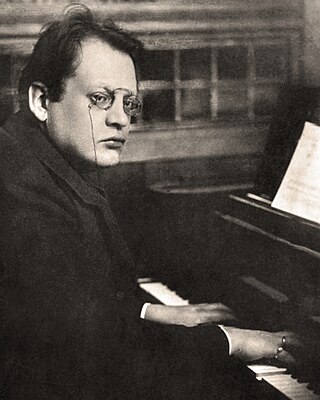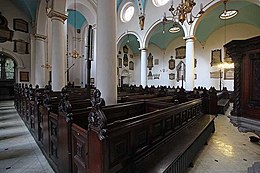
The War Requiem, Op. 66, is a large-scale setting of the Requiem composed by Benjamin Britten mostly in 1961 and completed in January 1962. The War Requiem was performed for the consecration of the new Coventry Cathedral, which was built after the original fourteenth-century structure was destroyed in a World War II bombing raid. The traditional Latin texts are interspersed, in telling juxtaposition, with extra-liturgical poems by Wilfred Owen, written during World War I.

John Milford Rutter is an English composer, conductor, editor, arranger, and record producer, mainly of choral music.
Herbert Whitton Sumsion was an English musician who was organist of Gloucester Cathedral from 1928 to 1967. Through his leadership role with the Three Choirs Festival, Sumsion maintained close associations with major figures in England's 20th-century musical renaissance, including Edward Elgar, Herbert Howells, Gerald Finzi, and Ralph Vaughan Williams. Although Sumsion is known primarily as a cathedral musician, his professional career spanned more than 60 years and encompassed composing, conducting, performing, accompanying, and teaching. His compositions include works for choir and organ, as well as lesser-known chamber and orchestral works.
David John Briggs is an English organist and composer.
Malcolm Archer is an English composer, conductor and organist. He was formerly Organist and Director of Music at Bristol Cathedral, at Wells Cathedral and at St Paul's Cathedral and Director of Chapel Music at Winchester College.

The Te Deum by Hector Berlioz (1803–1869) was completed in 1849. Like the earlier and more famous Grande Messe des Morts, it is one of the works referred to by Berlioz in his Memoirs as "the enormous compositions which some critics have called architectural or monumental music." While the orchestral forces required for the Te Deum are not as titanic as those of the Requiem, the work calls for an organ that can compete on equal terms with the rest of the orchestra. It lasts approximately fifty minutes and derives its text from the traditional Latin Te Deum, although Berlioz changed the word order for dramatic purposes.

The Quattro pezzi sacri are choral works by Giuseppe Verdi. Written separately during the last decades of the composer's life and with different origins and purposes, they were nevertheless published together in 1898 by Casa Ricordi. They are often performed as a cycle, not in chronological sequence of their composition, but in the sequence used in the Ricordi publication:

John Rutter's Gloria is a musical setting of parts of the Latin Gloria. He composed it in 1974 on a commission from Mel Olson, and conducted the premiere in Omaha, Nebraska. He structured the text in three movements and scored it for choir, brass, percussion and organ, with an alternative version for choir and orchestra. It was published in 1976 by Oxford University Press.

The Festival Te Deum is the popular name for an 1872 composition by Arthur Sullivan, written to celebrate the recovery of Albert Edward, Prince of Wales from typhoid fever. The prince's father, Prince Albert, had died of typhoid fever in 1861, and so the prince's recovery was especial cause for celebration.

Utrecht Te Deum and Jubilate is the common name for a sacred choral composition in two parts, written by George Frideric Handel to celebrate the Treaty of Utrecht, which established the Peace of Utrecht in 1713, ending the War of the Spanish Succession. He composed a Te Deum, HWV 278, and a Jubilate Deo, HWV 279. The combination of the two texts in English follows earlier models. The official premiere of the work was on 13 July 1713 in a service in St Paul's Cathedral in London.

The Company of Heaven is a composition for soloists, speakers, choir, timpani, organ, and string orchestra by Benjamin Britten. The title refers to angels, the topic of the work, reflected in texts from the Bible and by poets. The music serves as incidental music for a mostly spoken radio feature which was first heard as a broadcast of the BBC in 1937.

The Festival Te Deum, Op. 32, a sacred choral piece by the English composer Benjamin Britten, is a setting of the Te Deum from the Book of Common Prayer. It was composed in 1944 to celebrate the centenary of St Mark's Church, Swindon, and was first performed there in 1945.
A Boy Was Born, Op. 3, is a choral composition by Benjamin Britten. Subtitled Choral variations for men's, women's and boys' voices, unaccompanied , it was originally composed from 1932 to 1933. It was first performed on 23 February 1934 as a BBC broadcast. Britten revised the work in 1955. The composer set different texts related to Christmas to music as theme and variations, scored for an a cappella choir with boys' voices.

Der 100. Psalm, Op. 106, is a composition in four movements by Max Reger in D major for mixed choir and orchestra, a late Romantic setting of Psalm 100. Reger began composing the work in 1908 for the 350th anniversary of Jena University. The occasion was celebrated that year with the premiere of Part I, conducted by Fritz Stein on 31 July. Reger completed the composition in 1909. It was published that year and premiered simultaneously on 23 February 1910 in Chemnitz, conducted by the composer, and in Breslau, conducted by Georg Dohrn.

Collegium Regale is a collection of choral settings by the English composer Herbert Howells of the canticles for the Anglican services of Mattins, Holy Communion and Evening Prayer. Scored for four-part choir, solo tenor and organ, the pieces were written between 1944 and 1956 "for the King's College, Cambridge". The first of the pieces were first published by Novello in 1947, and they have become a popular piece of music in the Anglican church music repertoire.

Children's Crusade, Op. 82, subtitled a Ballad for children's voices and orchestra is a composition by Benjamin Britten. He completed it in 1969, setting Bertolt Brecht's poem Kinderkreuzzug 1939 for children's choir with some solo parts, keyboard instruments and an array of percussion, to be performed mainly by children. It was first performed in an English version at St Paul's Cathedral in London on 19 May 1969.

Benjamin Britten's Jubilate Deo is a sacred choral setting of Psalm 100 in English, written in 1961 for St George's Chapel, Windsor Castle, "at the request of H.R.H. The Duke of Edinburgh". Britten scored the joyful music in C major for four-part choir and organ. A late companion piece to his 1934 Te Deum in C, it is also known as his Jubilate in C. It has been performed and recorded often, including on Prince Philip's 80th and 90th birthdays, and for his funeral service on 17 April 2021.

Hymn to St Peter is a cantata for treble soloist, SATB choir and organ composed by Benjamin Britten in 1955. The piece was the last Britten composed before he first travelled to Asia. He set the text from the gradual of the Feast of Saints Peter and Paul to music which was based on the plainsong of the Alleluia from the hymn. The piece starts with a sombre organ theme in B Flat and when the choir joins in it is initially in unison before breaking into harmonies. After a nimble interlude that recalls children's play, the piece returns to the original theme, ending with a coda played by the organ alone. The piece was first performed at the quincentenary celebrations of St Peter Mancroft, Norwich on 20 November 1955. It was subsequently performed by The Sixteen under Harry Christophers and has frequently been sung with children's voices.













